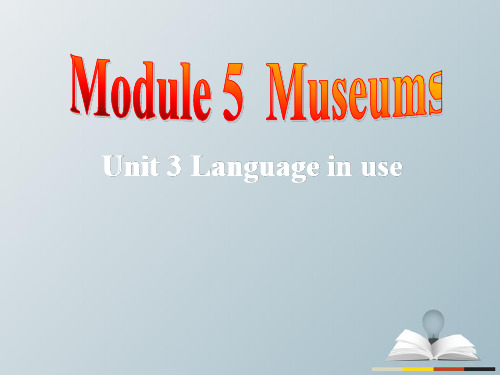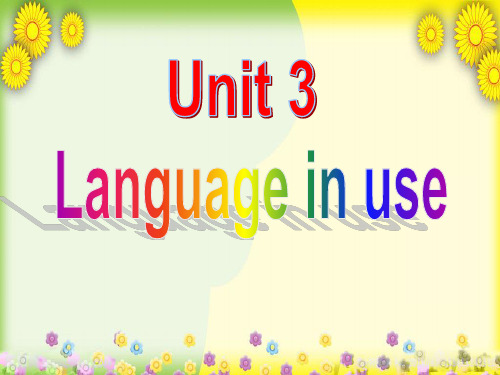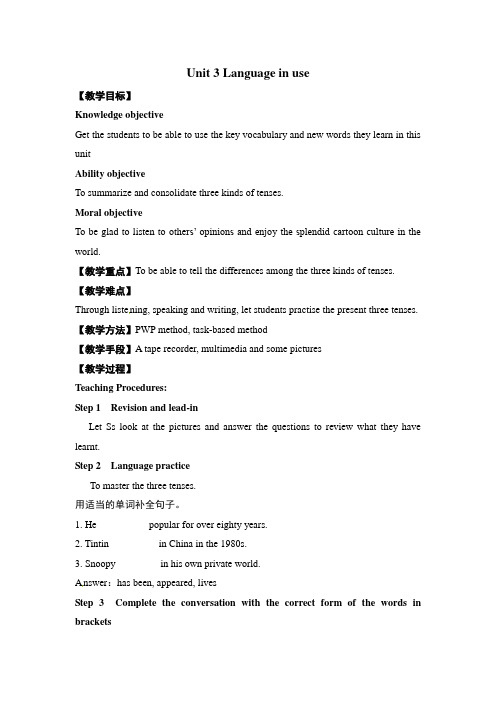九年级英语上册Module5MuseumsUnit3Languageinuse教案新版外研版
九级英语上册Module5MuseumsUnit3Languageinuse课件(

6. Complete the sentences with the words or expression in the box.
at between inside into next to on
1. The Science and Technology Room is __o_n_____ the third floor. 2. Take the lift to the third floor. It is over there, _n__ex_t__to___ the stairs. 3. There is a garden __a_t___ the back of the building.
2 No football. 3 No right turn. 4 No parking. 5 No littering. 6 No food and drinks.
2. Look at the signs and write the rules.
①
②
_D__o_n_o_t_t_o_u_c_h_. _N__o_s_m_o_k_i_n_g_._
③
④
__N__o_p_h_o_t_o_s.__ __N__o_e_n_t_r_y.___
3. Complete the sentences with the correct form of the words in brackets.
Ready?
1. If you __w_a_n_t__(want) to see old machines, __g_o____(go) to the museum.
2. If you _v_i_s_it__(visit) London, __t_a_k_e__(take) a boat trip on the river.
九年级英语上册Module5MuseumsUnit3Languageinuse课件新版外研版

A.
B.
C.
D.
【点拨】根据常识及图片可知,表示“禁止酒后驾车”
的是A ,故选A。
返回
( A )7. [2023 安徽] Our country will be much better for everyone in future _______ we all do something to help now. A. if B. before C. so that D. even though
【点拨】考查连词辨析。if 如果;before 在……之前; so that 以便;even though 即使。空格后是前面的肯定条 件,用if 引导条件状语从句。故选A。
返回
( B )8. If you want to get good grades, _______ in as much
effort as possible.
返回
In the old days, people believed that teachers had to be very 18 and had the right to punish the students. ( C )18. A. kind B. clever C. strict D. careful 【点拨】根据“had the right to punish the students”可知, 老师是很严厉的。故选C。
( D )21. A. about B. from C. except D. without
【点拨】根据“Following the rules can also help the students
in the classroom to learn...difficulty.”可知,遵守规则也可
九年级英语上册《Module 5 Museums Unit 3 Language in use》课件

1. No shouting, please! 2. Don’t cross that rope! 3. Don’t be rude! 4. If you ever go to London, make
sure you visit the Science Museum.
Look at the signs and write the rules.
Don’t touch.
No smoking.
No photos.
No entry.
What does each sign mean? Write the rules.
Don’t drink the water. No fire.
Please close the door. 请把门关上。
Sit down, please. 请坐。
Don’t worry. Be happy. 不要担心,高兴点儿。
Don’t bring any food or drink into the lab next time.
下次不要把任何食物或饮料带到实验 室来。
2. if从句的位置 if引导的从句可以放在主句之前,也 可以放在主句之后。例如:
If you ever go to London, make sure you visit the Science Museum. 如果你去伦敦,一定要去参观科学 博物馆。可以改写为:
Make sure you visit the Science Museum if you ever go to London.
No shouting. 请勿喧哗。 No joking! 不要开玩笑! 2) No + 名词 e.g. No photos. 请勿拍照。 No entry. 请勿入内。 3) 祈使句 祈使句同样可以用来表示“禁止做某 事”。 e.g. Don’t make any noise. 不要吵闹。 Keep off the grass. 请勿践踏草坪。
外研版九上M5 Museums Unit 3 Language in use课件

Well, here we are at the Science Museum. Today we will be looking at ancient and modern technology. You can learn about history (1) _a_s__w_e_l_l _a_s technology.
ancient and modern times (5) __a_s__w__e_ll____.
I’m (6) __lo_o_k_i_n_g_f_o_r_w_a_r_d__t_o_ reading the reports of your visit.
Listen and label the different parts of the museum.
4 If the weather ___g_e_t_s__ (get) colder, __p_u_t___ (put) on more warm clothes.
5 If any student ___h_a_s___ (have) a high fever, ___s_e_n_d_ (send) him / her to the school.
without paying.
5 The shop is __b_e_tw__e_en___ the ticket office and the main door.
6 There must be another way ___in_t_o_____ the room.
Complete the passage with the expressions in the box.
外研版九年级英语上册Module 5 Museums Unit-3-Language-in-use-教案

Unit 3 Language in use【教学目标】Knowledge objectiveGet the students to be able to use the key vocabulary and new words they learn in this unitAbility objectiveTo summarize and consolidate three kinds of tenses.Moral objectiveTo be glad to listen to othe rs’ opinions and enjoy the splendid cartoon culture in the world.【教学重点】To be able to tell the differences among the three kinds of tenses.【教学难点】Through liste ning, speaking and writing, let students practise the present three tenses. 【教学方法】PWP method, task-based method【教学手段】A tape recorder, multimedia and some pictures【教学过程】Teaching Procedures:Step 1 Revision and lead-inLet Ss look at the pictures and answer the questions to review what they have learnt.Step 2 Language practiceTo master the three tenses.用适当的单词补全句子。
1. He ____ _____ popular for over eighty years.2. Tintin _________ in China in the 1980s.3. Snoopy ________ in his own private world.Answer:has been, appeared, livesStep 3 Complete the conversation with the correct form of the words in brackets1.Read the dialogue carefully.e the correct form of the words in brackets to fill in the blanks.Daming: Hi, Tony. What are you reading?Tony: The Adventures of Tintin. It’s fantastic. (1)_____ yo u __________(ever read) aTintin book?Daming: No, I (2)_______________ (never read) a Tintin story. (3)_____ (be) they popular?Tony: Yes, they (4)__________(be) popular for more than eighty years. The first Tintinstory (5)________(appear) in 1929.Daming: What does Tintin do?Tony: He (6)_______ (work) for a newspaper and he (7) ______ (have) lots of exciting experiences.Daming: And (8)_____ the stories ______(have) happy endings?Tony: Oh, yes, they always do.Daming: Sounds great! Do you mind if I borrow your book?Answers: 1.Have, ever read 2. have never read 3. Are 4. have been 5.appeared6. works7. has8. do, haveStep 4 Complete the passage with the correct form of the words in brackets1.Read the passage carefully.e the correct form of the words in brackets to fill in the blanks.When I was young, I (1)_________ (not like) green vegetables. The only vegetable I (2) ____ (eat) was potatoes. I was quite small and not very strong, so I was not very good at sport. Then when I (3)_____________ (watch) television one day I saw the cartoon Popeye. When Popeye stands next to the bad man, Bluto, he(4)_______ (look) small and weak, and when they fight, he always (5)______ (lose). Then he eats some green vegetables. His arms(6)_______ (grow) thicker.He becomes stronger and he wins his fights. The next day I was going to playfootball at school, so I asked my mother for some green vegetables. I (7)________ (score) three times and we won the match! I (8)__________ (love) green vegetables ever since.Answers: 1. didn’t like 2. ate 3. was watching 4. looks 5. loses 6. grow 7.scored8. have lovedStep 5 Complete the passage with the words in the box1.Read the passage carefully. e the correct form of the words in the box to fill in the blanks.Many people love cartoons because they are great fun.Parents and children (1)______ together as the Monkey King makes a terrible(2)_____ or Shrek, the (3)_____ green animal, sing a song. Cartoon heroes oftenlive in a(n)(4)______ world of their (5)_____.Artists (6)_______ good cartoon heroes as well as bad people. The heroes always win,and their stories (7)______ us and help us feel safe.Answers: ugh 2. mess 3. ugly 4. private 5. own 6. create 7.satisfyStep 6 Work in pairs and decide on the best order for the pictures1.Look through the picture and discuss in pairs.2.Draw the correct answers from other group.Step 7 Now listen and checkNow listen and check which one is right.Step 8 ListeningListen to Part 5 and answer the questions.1. Why does Betty not think the cartoon is funny at first?2. Why does Tony think the cartoon is really clever?Answer:1. Because she does not understand it at first.2. Because the policeman could catch the man in the lift, but he doesn’t.They both just stand there, waiting for the lift to stop!Step 9 Learning to learnLearn about how to listen to a word you don’t kno w.When you’re listening, do not stop paying attention when you hear a word you do not know. Keeping listening. The word might not be important, or the speaker may say something to explain its meaning.Step 10 ListeningListen to Part 6 and answer the questions.1) Where did the first cartoon appear?2) When did Walt Disney start to make films?3) Was Micky Mouse Walt Disney’s most famous cartoon character?Answer:1. In newspapers.2. In 1920s.3. Yes, it was.Step 11 Read the passage and complete the sentencesRead the passage in Part 6 and fill in the blanks.Step 12 Language Pointsbe popular with 意为“为……所喜欢;受……欢迎”,后接名词或代词作宾语。
外研版英语九年级上册Module 5 Museums Unit 3 Language in use全

外研版英语九年级上册Module 5 Museums Unit 3 Language in use全知识点同步练习(含答案)Module 5 Unit 3 同步练习I. 完成句子1. 你可以下楼去拿些水吗Can you to get some water2. 妈妈经常把我和我的同学比较。
My mother often me my classmates.3. 他盼望着参观大英博物馆。
He is visiting the British Museum.4. 丹尼尔下象棋跟约翰一样好。
Daniel plays chess John.5. 旅游时, 我们应该注意些什么呢What should we when we are travelingII. 补全对话Han Mei: Hi, Daming! I haven’t seen you for a long time.1.Daming: Hi, Han Mei! I have been to London.Han Mei: 2. It is so wonderful! What impressed you mostDaming: The London Science Museum, of course. I have never seen so many interesting things before. For example, I went to Launch Pad to do physics experiments, and I also went to Rocket Show to learn about traveling in space and so on.Han Mei: It’s great! 3.Daming: It’s free and it’s open every day.Han Mei: 4.Daming:From 10 a. m. to 6 p. m. . So if you ever go to London, make sure you visit the London Science Museum.Han Mei: 5. .III 用所给词的适当形式填空1. Radio and television are important means of(communicate).2. There’s a big(swim) pool in our school.3. I think students shouldn’t be allowed(drive).4. Do you often offer(help) people when they are in need of help5. I’m writing a composition(call) “How to keep healthy〞.IV 单项选择1. —Will you go on a school trip this weekend—We’ll go it doesn’t rain.A. as long asB. as well asC. as far asD. as soon as2. You can the museum when you stay in London.A. drop in atB. drop in onC. drop on atD. drop on in3. More than four fifths of rice in China in the south.A. growB. grewC. growsD. grown4. The farmer keeps pigs on his farm.A. hundred ofB. two hundred ofC. two hundredsD. hundreds of5. —Let’s together.—All right.A. to go to swimB. go swimmingC. to go swimmingD. go for swimmingⅤ. 完形填空Last Wednesday, Mr. Chen1his class to the Space Museum. There were many things2space there. First, the children3 a film about space travel.They saw how the space shuttle4in space and later landed on the earth again. It was very5and the children felt they were traveling 6themselves.After the film, Mr. Chen took them to see some models of rockets and the space shuttle. The models looked very7, but they were8 smaller. Then the children saw some moon rocks. Two Americans landed on the moon in 1969. They put an American flag there. Then they tooksome rocks back to9earth.Before the children left, they also watched a video show about people living and working in a space lab. The people could stay in the space lab 10months.1. A. showed B. wanted C. made D. took2. A. about B. for C. in D. with3. A. looked at B. saw C. listened to D. looked4. A. took away B. took up C. take out D. took off5. A. excited B. exciting C. excite D. interested6. A. on space B. in a space C. in the space D. in space7. A. real B. really C. true D. truly8. A. too B. very C. much D. quite9. A. the B. a C. an D. /10. A. in B. during C. since D. for答案:I.1. go downstairs1. compares; with3. looking forward to4. as well as5. pay attention toII.1. Where have you been2. Really3. How much is the ticket4. How long is it open5. I think I will III1. communication2. swimming3. to drive4. to help5. called IV.1~5 AACDBⅤ.1~5. DABDB6~10. DACAD。
初中英语外研版九年级上册《Module5 Unit 3 Language in use第二课时》课件
plete the sentences with the words or expression in the box.
at, between, inside, into, next to, on
1. The Science and Technology Room is _o_n___ the third floor. 2. Take the lift to the third floor. It is over there, _n_e_x_t_t_o_ the stairs. 3. There is a garden __a_t___ the back of the building.
one of + 形容词最高级:最……之一
eg. He is one of the best students in that class . 他是那个班最好的学生之一.
2. next to 的用法
The Louvre is in a beautiful old palace next to the River Seine, but you enter through a modern glass pyramid that the museum added in 1989. next to: 紧邻; 在…近旁;
I’m (6)l_o_o_k_in_g__f_o_r_w_a_r_d_t_o__ reading the reports of your visit.
挑选正确的选项:
1. If he asks again, ________ him the money.
A. give
B. gives
C. will give
Find or draw pictures for your guide, showing what you can see at the museum. Then present your guide to the class.
最新外研版九年级英语上册《Module 5 Museums Unit 3 Language in use》教案
Unit 3 Language in useClass Type Revision and applicationObjectives To learn more about signs in public places;To summarize and consolidate the use of if –clause, theimperative sentences and the new vocabulary;To plan a guide to a museum.Difficulties To use if –cla use and the imperative sentences.Period 2ProcedureLead-in 1. Review: Translate the phrases in Unit 2 into English.2. Present a picture and let Ss describe it using imperativesentences.Step 1 Summarize some ways of forbiddi ng sb. to do sth.Step 2 Explain the use of imperative sentences.Step 3 Present some signs and write the rules, using imperativesentences.Step 4 Do exercise related to imperative sentences.Step 5 Read some sentences including if-clause. Let Ss get fami liarwith if-clause.Step 6 Explain the use of if-clause.Step 7 Activity 3Complete the sentences with the correct form of the words inbracket s.Step 8 Complete the sentences according to t he pictures andexpressions given.Step 9 Do more exercise related to if-clause.Step 10 Explai n the meaning of ground floor. Tell Ss it is one of thedifferences between American English and British English. Step 11 Before doing Activity 5, ask Ss to read the information. Workin pairs. Ask and answer some questions about the museum. Step 12 Ask Ss to write or say some advice for visitors, usingif-clause.Step 13 Present some prepositions and ask Ss to make a sentence witheach one. Then complete Activity 6.Step 14 Complete Activity 7.Step 15 L is ten and complete Activity 8.Step 16 Listen again and answer some que stions.Step 17 Introduce the Louvre Museum by p resenting pictures and avideo.Step 18 Read the passage in Around the world and answer somequestions.Step 19 Free talkIf you have a chance to visit the Louvre Museum, what wouldyou like to see?Step 20 Knowledge ExpansionIntroduce some famous museums around the world Step 21 Module taskPlanning a guide to a museum。
Module5museumsUnit3课件九年级英语上册
You aren't allowed to take photos.
Match the signs with the rules.
please.
Grammar 1
“禁止做某事”的句型总结
1. No + v. -ing/ n.! 2. Don't + v. 3. mustn't + v. 4. can't + v. 5. You aren’t allowed to + v.
1. No + v. -ing/ n.! 禁止做…… eg. No talking!
Complete the sentences with the correct form of the words in brackets.
want
go
visit
take
start wait
4. If the weather _g_e_t_s_ (get) colder, __p_u_t__ (put) on more warm clothes. 5. If any student __h_a_s__ (have) a high fever, __se_n_d__ (send) him / her to the school doctor at once. 6. If you __w_a_n_t_ (want) to know how it works, _r_e_a_d__ (read) the book.
九年级英语上册 Module 5 Museums Unit 3 Language in use教学课件 外研版
Find one word in the passage which means: a ball that you can shoot into a basket basketball walking in the hills hill Walking 1 writing letters letter writing 2 a library where you can borrow videos video library 3 a pool where you can go swimming swimming pool
14
4 a school where you can learn to ride riding school 5 a shop where yon can buy books bookshop 6 riding horses horse-riding 7 seeing the sights sightseeing
11
Wed. 6 Wednesday ________
4. Make new words using the words in Box A and Box B. A B bed card class room down site home stairs post work up web
12
5. Read the passage and answer the questions. The city of Bath 1 Where can you find out about the history of communication? In the museum of postal History. 2 What outdoor activities can you do? Horse-riding, hill walking, swimming and basketball.
- 1、下载文档前请自行甄别文档内容的完整性,平台不提供额外的编辑、内容补充、找答案等附加服务。
- 2、"仅部分预览"的文档,不可在线预览部分如存在完整性等问题,可反馈申请退款(可完整预览的文档不适用该条件!)。
- 3、如文档侵犯您的权益,请联系客服反馈,我们会尽快为您处理(人工客服工作时间:9:00-18:30)。
Unit 3 Language in use
【教学目标】
【教学思路】
1.复习上节课内容,以课件形式呈现词汇和句型,让学生复习。
2.让学生巩固词汇,学会灵活运用所学句型。
【教学准备】
各种标志,卡片,多媒体等。
【教学过程】
Step 1 Warming up
1.师生问候。
2.就上节课学过的词汇和句型,进行随机抽查,让学生拼读或造句。
活动小结:复习学过的祈使句,让学生明白本课时学习重点。
Step 2 Presentation
1.师生对话,一说一译。
T:No shouting,please!
S:请禁止喧哗!
T:Don't cross that rope!
S:…
T:Don't be rude!
S:…
T:…
S:…
2.Learn about the signs.
(1)教师用幻灯片展示自己收集的各种标志让学生说说标志所表示的含义。
让学生畅所欲言,也说说自己见过的有意思的标志。
(2)让学生完成活动1和2,这些标志都很常见,不需要做特别的说明,如果学生有不了解的可以在一起核对答案的时候重点强调一下。
(3)教师重点总结强调一下祈使句的应用和构成。
①祈使句,表达说话人对对方的叮嘱、劝告、希望、禁止、请求或命令等。
祈使句一般以动词原形开头,无时态和数的变化,句末用句号或感叹号,用降调。
②祈使句有三种类型:
含第二人称主语的祈使句
a.当祈使的对象是第二人称you时称为含第二人称主语的祈使句。
这时,主语you通常会省略,谓语动词用原形。
有时在句首或句末加please,还可加上称呼语,用逗号与句子主体隔开。
如:
Please be quiet,boys!孩子们,请安静!
如果要加强语气,可在动词前加do。
如:
Do keep away from the fire!切记远离火种!
b.否定式在谓语动词前加Don't或Do not,强调否定式则在动词前加Never。
如:Don't always make the same mistake.不要老犯同一个错误。
c.有时为了强调指明向谁提出要求或发出命令,或表达说话人的急躁、厌烦、不满、恼怒的情绪,就用主语you表示,且放在动词前。
如:
You mind your head!小心别碰到头了!
若为否定式,则把Don't放在主语you之前。
如:
Don't you come here!你别来这里!
含第一、第三人称主语的祈使句
a.含第一或第三人称主语的祈使句通常以let开头,第一人称由“Let+me/us +动词原形”构成,第三人称由“Let+第三人称代词(用宾格)或名词+动词原形”构成。
这类祈使句往往用于提出建议。
如:
Let me have a try if you don't want to.如果你不想,就让我试一试吧。
有时也可以先称呼对方的名字,后跟一句无人称主语的祈使句。
如:
Jane,sit down please.简,请坐下。
b.这类祈使句的否定式是在动词原形前加not,也可以在let前加Don't。
如:
Don't let him go out.别让他出去。
无动词祈使句
在请求、命令和口号中,常用无动词祈使句,它实际上是省略了动词,从而使语句更简洁或有力。
如:
Just a minute,please!请稍等!
在一些指示牌上,常用“No+动名词/名词”构成简略式的否定祈使句。
如:
No smoking!禁止抽烟!
还有一些是祝词类的无动词祈使句,如:
Long live our friendship!我们的友谊万岁!
活动小结:总结祈使句的用法,帮学生总结归纳语法。
Step 3 Practice & Consolidation
1.Complete the sentences with the correct form of the words in brackets.
(1)教师让学生总结句型:If you+动词一般现在时,+动词原形.
表达建议的一种,后面直接跟动词原形,if如果,表示条件。
(2)让学生完成活动3中的练习,一起核对答案。
(3)尽量让学生用此句型再进行造句,锻炼学生对此句型的熟练使用。
2.Complete the sentences with your own ideas.
(1)Ask students to finish the sentences.
(2)Work in pairs,exchange the sentences to read.
(3)Invite some students to present their sentences to the class to check them.
(4)Encourage students to do more exercises including the sentence pattern.
活动小结:这个练习锻炼学生的思维能力和写作能力。
Step 4 Speaking
1.教师让学生读关于活动5中博物馆的信息,按照“Opening hours,Please note,Charge,What is on,Contact us”几个方面对信息进行分解。
2.学生两人一组,分别就这五个方面的信息创编会话,最后选择五个组在全班表演会话。
3.教师最后让学生尽量写写在这个博物馆的注意事项。
4.如果还有时间,抽样检查几名学生的写作,读给全班学生听。
活动小结:锻炼学生获取关键信息的能力。
Step 5 Homework
1.让学生用本课时学过的句型写句子。
2.完成关于活动5的写作。
【板书设计】
Unit 3Language in use
Language practice:
1.No shouting,please!
2.Don't cross that rope!
3.Don't be rude!
4.If you ever go to London,make sure you visit the Science Museum.。
